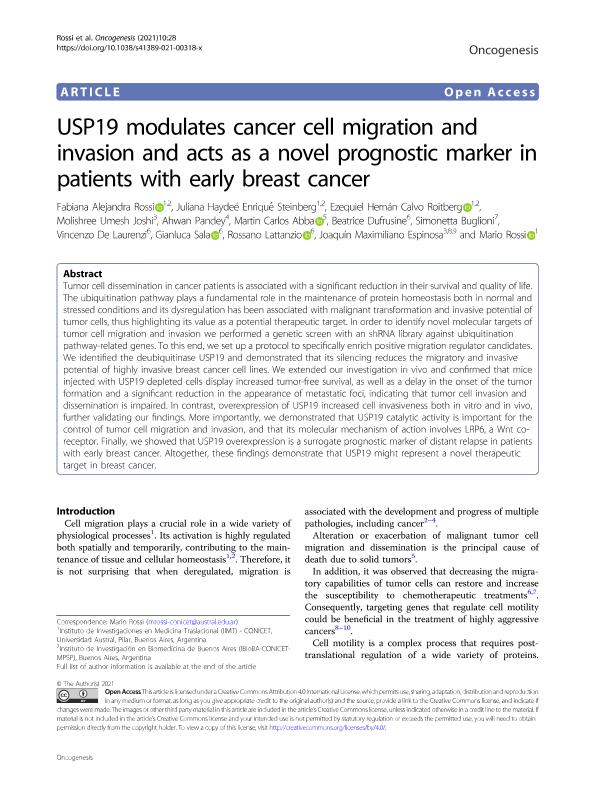Artículo
USP19 modulates cancer cell migration and invasion and acts as a novel prognostic marker in patients with early breast cancer
Rossi, Fabiana Alejandra ; Enriqué Steinberg, Juliana Haydeé
; Enriqué Steinberg, Juliana Haydeé ; Calvo Roitberg, Ezequiel Hernán; Joshi, Molishree Umesh; Pandey, Ahwan; Abba, Martín Carlos
; Calvo Roitberg, Ezequiel Hernán; Joshi, Molishree Umesh; Pandey, Ahwan; Abba, Martín Carlos ; Dufrusine, Beatrice; Buglioni, Simonetta; De Laurenzi, Vincenzo; Sala, Gianluca; Lattanzio, Rossano; Espinosa, Joaquín Maximiliano; Rossi, Mario
; Dufrusine, Beatrice; Buglioni, Simonetta; De Laurenzi, Vincenzo; Sala, Gianluca; Lattanzio, Rossano; Espinosa, Joaquín Maximiliano; Rossi, Mario
 ; Enriqué Steinberg, Juliana Haydeé
; Enriqué Steinberg, Juliana Haydeé ; Calvo Roitberg, Ezequiel Hernán; Joshi, Molishree Umesh; Pandey, Ahwan; Abba, Martín Carlos
; Calvo Roitberg, Ezequiel Hernán; Joshi, Molishree Umesh; Pandey, Ahwan; Abba, Martín Carlos ; Dufrusine, Beatrice; Buglioni, Simonetta; De Laurenzi, Vincenzo; Sala, Gianluca; Lattanzio, Rossano; Espinosa, Joaquín Maximiliano; Rossi, Mario
; Dufrusine, Beatrice; Buglioni, Simonetta; De Laurenzi, Vincenzo; Sala, Gianluca; Lattanzio, Rossano; Espinosa, Joaquín Maximiliano; Rossi, Mario
Fecha de publicación:
03/2021
Editorial:
Nature Publishing Group
Revista:
Oncogenesis
ISSN:
2157-9024
Idioma:
Inglés
Tipo de recurso:
Artículo publicado
Clasificación temática:
Resumen
Tumor cell dissemination in cancer patients is associated with a significant reduction in their survival and quality of life. The ubiquitination pathway plays a fundamental role in the maintenance of protein homeostasis both in normal and stressed conditions and its dysregulation has been associated with malignant transformation and invasive potential of tumor cells, thus highlighting its value as a potential therapeutic target. In order to identify novel molecular targets of tumor cell migration and invasion we performed a genetic screen with an shRNA library against ubiquitination pathway-related genes. To this end, we set up a protocol to specifically enrich positive migration regulator candidates. We identified the deubiquitinase USP19 and demonstrated that its silencing reduces the migratory and invasive potential of highly invasive breast cancer cell lines. We extended our investigation in vivo and confirmed that mice injected with USP19 depleted cells display increased tumor-free survival, as well as a delay in the onset of the tumor formation and a significant reduction in the appearance of metastatic foci, indicating that tumor cell invasion and dissemination is impaired. In contrast, overexpression of USP19 increased cell invasiveness both in vitro and in vivo, further validating our findings. More importantly, we demonstrated that USP19 catalytic activity is important for the control of tumor cell migration and invasion, and that its molecular mechanism of action involves LRP6, a Wnt co-receptor. Finally, we showed that USP19 overexpression is a surrogate prognostic marker of distant relapse in patients with early breast cancer. Altogether, these findings demonstrate that USP19 might represent a novel therapeutic target in breast cancer.
Palabras clave:
USP19
,
BREAST CANCER
,
INVASION
,
MIGRATION
Archivos asociados
Licencia
Identificadores
Colecciones
Articulos(IBIOBA - MPSP)
Articulos de INST. D/INV.EN BIOMED.DE BS AS-CONICET-INST. PARTNER SOCIEDAD MAX PLANCK
Articulos de INST. D/INV.EN BIOMED.DE BS AS-CONICET-INST. PARTNER SOCIEDAD MAX PLANCK
Articulos(IIMT)
Articulos de INSTITUTO DE INVESTIGACIONES EN MEDICINA TRASLACIONAL
Articulos de INSTITUTO DE INVESTIGACIONES EN MEDICINA TRASLACIONAL
Citación
Rossi, Fabiana Alejandra; Enriqué Steinberg, Juliana Haydeé; Calvo Roitberg, Ezequiel Hernán; Joshi, Molishree Umesh; Pandey, Ahwan; et al.; USP19 modulates cancer cell migration and invasion and acts as a novel prognostic marker in patients with early breast cancer; Nature Publishing Group; Oncogenesis; 10; 3; 3-2021; 1-15
Compartir
Altmétricas



